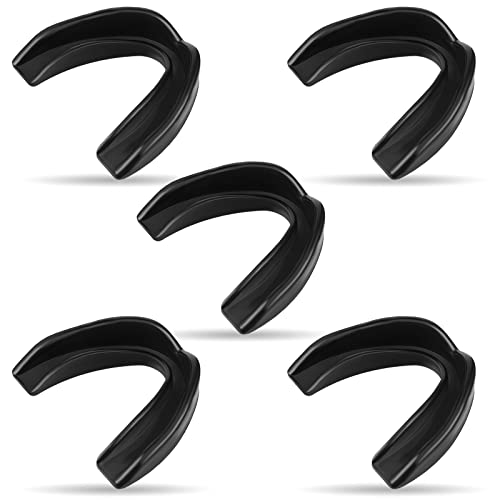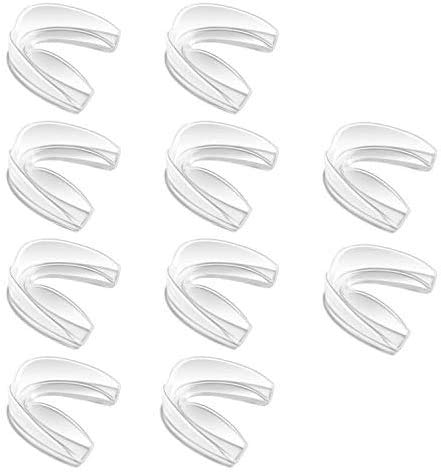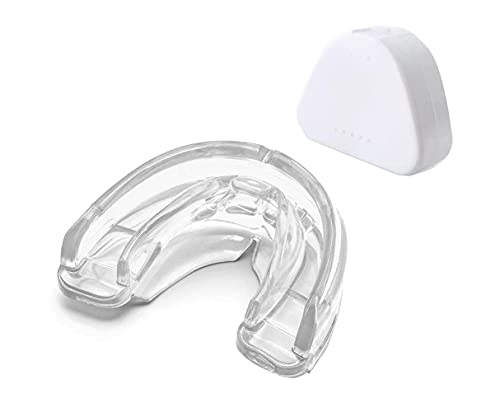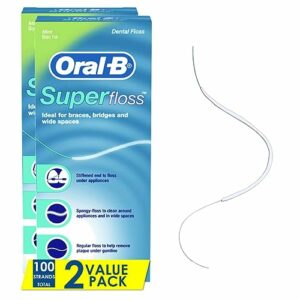Hey there, fellow sports enthusiasts! We understand the dedication and passion that goes into being an athlete, and we know that protecting your body is a top priority. That’s why we want to talk to you about something that might not always be at the forefront of your mind – wearing a mouthguard. In this post, we want to shed light on the top 5 reasons why athletes, like you, should consider wearing a mouthguard during games and practices. We know that your well-being and success on the field are important, so let’s dive right into why this small piece of protective gear can make a big difference.
Protect Your Smile and Stay in the Game
Protect Your Smile: The Importance of Wearing a Mouthguard
We all know that participating in sports and physical activities offers numerous benefits for our overall health and well-being. However, it’s essential to remember that these activities also come with a risk of dental injuries. Whether you’re an avid athlete or a weekend warrior, taking steps to protect your teeth should be a top priority. One effective way to safeguard your smile is by wearing a mouthguard.
What is a Mouthguard?
A mouthguard is a protective device made of soft plastic material that fits over your teeth. It acts as a cushion, absorbing and redistributing the force of impact to minimize the risk of dental injuries. They are commonly used in contact sports like football, hockey, and boxing, but they are also recommended for any activity that poses a risk of facial or dental trauma.
Preventing Fractures, Chips, and Other Dental Injuries
Wearing a mouthguard can provide a range of benefits when it comes to protecting your teeth. Here are some key ways in which a mouthguard can safeguard your smile:
- Preventing Fractures: A strong impact to the face during athletic activities can lead to fractures in the teeth. The cushioning effect of a mouthguard can absorb the force of the impact, reducing the risk of fractures.
- Minimizing Chips: Teeth can easily chip or break when exposed to sudden blows or collisions. A mouthguard acts as a barrier, shielding your teeth from direct contact and significantly lowering the risk of chips.
- Avoiding Tooth Displacement: The forceful impact experienced during sports can cause teeth to shift or become displaced. Wearing a mouthguard can help stabilize your teeth and prevent them from moving out of their proper alignment.
- Protecting Against Soft Tissue Injuries: Dental injuries not only affect your teeth but can also harm your lips, tongue, and cheeks. A mouthguard acts as a cushion, reducing the risk of cuts, lacerations, and bruises to the soft tissues in your mouth.
Types of Mouthguards
When it comes to mouthguards, there are a few options to choose from. Here are the main types:
- Stock Mouthguards: These are pre-made and come ready to wear. While they are affordable and readily available, they can be bulky, less comfortable, and offer limited protection.
- Boil and Bite Mouthguards: These mouthguards can be customized by softening them in boiling water and then biting into them to create a mold of your teeth. They provide a better fit than stock mouthguards and offer moderate protection.
- Custom-Fitted Mouthguards: The most effective option, these mouthguards are made by dental professionals. They are custom-designed to fit your teeth precisely, providing optimal comfort and protection.
The Benefits of Wearing a Mouthguard
Wearing a mouthguard offers several advantages, including:
- Protection against dental injuries, fractures, and chips.
- Reduced risk of tooth loss or displacement.
- Preservation of your natural smile, preventing the need for extensive dental treatments.
- Prevention of soft tissue injuries in the mouth.
- Enhanced confidence and peace of mind while participating in sports.
Prevention of jaw injuries
Jaw injuries are not only painful but can also have long-lasting consequences. Whether you’re an athlete, involved in physical activities, or simply concerned about your oral health, it’s crucial to take preventive measures to safeguard your jaw. One highly effective way to do this is by wearing a mouthguard. In this blog section, we will discuss the importance of mouthguards in preventing jaw injuries and how they provide support and cushioning to reduce the risk of fractures and dislocations.
What Are Mouthguards?
Mouthguards, also known as sports guards or mouth protectors, are devices made of soft and flexible material that cover and protect the teeth, gums, and jaw. They are commonly used during sports activities, but they can also be beneficial in various other situations to prevent jaw injuries.
The Role of Mouthguards in Jaw Injury Prevention
Support and Cushioning
One of the main ways mouthguards help prevent jaw injuries is by providing support and cushioning to the jaw. The jawbone is vulnerable to fractures and dislocations due to its position and the forces it can experience during physical activities. Mouthguards act as a shock absorber, dispersing and reducing the impact of external forces on the jaw. By absorbing and distributing the energy from a blow or impact, mouthguards minimize the risk of a serious injury.
Protection against Fractures
Fractures of the jaw can occur due to various reasons, such as direct blows, falls, or accidents. The force of impact can cause the jawbone to break, leading to severe pain and potential complications. However, wearing a mouthguard significantly reduces the risk of jaw fractures. The cushioning effect provided by the mouthguard plays a crucial role in minimizing the force transmitted to the jawbone, thereby preventing fractures.
Prevention of Dislocations
Dislocation of the jaw can be a painful and disruptive injury. It occurs when the lower jawbone becomes displaced from its normal position, causing difficulty in opening and closing the mouth. Mouthguards help prevent dislocations by stabilizing the jaw and keeping it securely in place. The snug fit and shock-absorbing properties of mouthguards offer optimal support to the jaw joint, reducing the likelihood of dislocation.
Additional Benefits of Mouthguards
In addition to preventing jaw fractures and dislocations, mouthguards offer several other benefits:
- Protect teeth from impact and reduce the risk of dental injuries, such as chipped or knocked-out teeth.
- Prevent cuts and lacerations to the lips, tongue, and inside of the mouth.
- Help prevent concussions by absorbing and dissipating the force of a blow to the jaw, reducing the risk of brain injury.
Choosing the Right Mouthguard
To ensure the best protection for your jaw, it’s essential to choose the right mouthguard. Here are some important factors to consider:
- Custom-fit mouthguards: These are made by dental professionals to fit your teeth and jaws precisely, offering the highest level of comfort and protection.
- Boil-and-bite mouthguards: These can be purchased over-the-counter and are softened in hot water before being molded to fit your mouth.
- Stock mouthguards: These are pre-formed and ready-to-wear, but they may not provide the same level of comfort and protection as custom-fit or boil-and-bite options.
Reduced Risk of Concussions with Mouthguards
Concussions are a serious concern, particularly for individuals involved in contact sports or activities with a high risk of head injuries. The potential long-term impact of concussions makes it crucial to take preventive measures. One effective way to reduce the risk of concussions is by wearing a properly fitted mouthguard.
How Mouthguards Help
Mouthguards act as a protective barrier, absorbing the impact and minimizing the force transmitted to the head and brain. They provide a buffer between the upper and lower jaws, dispersing the energy from a blow or impact. By doing so, mouthguards help reduce the risk of concussions and other head injuries.
Absorbing Impact
When an athlete receives a blow to the head or jaw, the mouthguard absorbs some of the force. This absorption of impact helps to prevent the direct transmission of force to the brain, reducing the likelihood of a concussion.
Minimizing Jaw Movement
In addition to absorbing impact, mouthguards also help to minimize excessive movement of the jaw. When the lower jaw moves forcefully, it can lead to a greater risk of concussions. The mouthguard acts as a stabilizing element, ensuring that the jaw remains in a more controlled position during impact.
Custom-Fitted Mouthguards
Custom-fitted mouthguards are recommended for the most effective protection against concussions. These mouthguards are tailored to fit the individual’s teeth and jaw, providing the best possible cushioning and shock absorption. Here are some key benefits of custom-fitted mouthguards:
- Superior Comfort: Custom-fitted mouthguards are designed to fit snugly and comfortably in the mouth, allowing for natural breathing and speech without any hindrance.
- Optimal Protection: The customized fit ensures that the mouthguard covers and protects all vulnerable areas, including the teeth, gums, and jaw.
- Improved Durability: Custom-fitted mouthguards are made from high-quality materials, offering enhanced durability and longevity.
- Better Performance: With a custom-fit, athletes can enjoy a greater range of motion and optimal performance without worrying about the mouthguard shifting or impeding their movements.
Comparison Table: Custom-Fitted vs. Stock Mouthguards
Here’s a quick comparison between custom-fitted and stock mouthguards to help you understand the benefits of opting for a custom-fit:
| Custom-Fitted Mouthguards | Stock Mouthguards |
|---|---|
| Personalized fit | Generic, one-size-fits-all design |
| Superior comfort | May be bulky and uncomfortable |
| Optimal protection | Limited protection and coverage |
| Long-lasting | Shorter lifespan |
| Does not interfere with speech or breathing | May cause speech and breathing difficulties |
The Connection Between Mouthguards and Improved Performance and Focus
When it comes to sports performance, athletes are constantly seeking ways to gain an edge over their opponents. While training, nutrition, and mental preparation are commonly addressed, there is one aspect that often goes overlooked – the mouth. Surprisingly, wearing a mouthguard can have a significant impact on an athlete’s confidence, leading to improved performance and focus during sports activities.
The Importance of Confidence
Confidence plays a crucial role in any athlete’s performance. When an athlete feels confident, they are more likely to perform at their best, make quick decisions, and take calculated risks. On the other hand, a lack of confidence can lead to hesitations, second-guessing, and overall subpar performance. So, how does wearing a mouthguard boost confidence levels? Let’s explore.
Physical Protection and Mental Security
One of the primary reasons athletes wear mouthguards is to protect their teeth and prevent injuries. By wearing a properly fitted mouthguard, athletes can reduce the risk of dental trauma and oral injuries caused by impact or collisions. This physical protection not only gives athletes peace of mind but also instills a sense of security, allowing them to focus solely on their performance without worrying about potential dental mishaps.
Enhanced Comfort and Performance
Wearing a mouthguard can also significantly improve an athlete’s comfort during physical activities. A well-fitted mouthguard acts as a cushion, absorbing shock and reducing the impact on the jaw, teeth, and surrounding tissues. This added comfort allows athletes to concentrate on their movements and techniques, resulting in enhanced performance.
Improved Breathing and Oxygen Intake
Proper oxygen intake is vital for athletes, as it directly affects their endurance and overall performance. Some athletes may find it challenging to breathe comfortably during intense physical activities due to factors like nasal congestion, respiratory issues, or simply the demanding nature of the sport. Wearing a mouthguard can alleviate these breathing difficulties by keeping the airways open and allowing for better airflow. As a result, athletes can maintain optimal oxygen intake, enhancing their stamina and focus throughout the game.
The Psychological Advantage
Apart from the physical benefits, wearing a mouthguard also has a psychological advantage that can positively impact an athlete’s performance. When an athlete wears a mouthguard, it serves as a visible and tangible reminder of their commitment to their sport. This simple act reinforces their dedication and helps them enter a focused mindset. Additionally, the act of wearing a mouthguard creates a routine and ritual that can help athletes mentally prepare and get into the zone before competing.
Key Benefits of Wearing a Mouthguard
To summarize the key points discussed above, here are the important benefits of wearing a mouthguard for improved performance and focus:
- Physical protection and reduced risk of dental injuries
- Enhanced comfort and reduced impact on the jaw and teeth
- Improved breathing and oxygen intake, leading to increased endurance
- Psychological advantage through commitment and focus reinforcement
Protect Your Smile and Your Game
In conclusion, we have discussed the top 5 reasons why athletes should wear a mouthguard. We highlighted the importance of protecting the teeth from injuries, preventing concussions, reducing the risk of jaw fractures, enhancing performance, and promoting overall oral health. Considering these factors, we highly recommend that athletes prioritize their safety and well-being by wearing a mouthguard during sports activities. By taking this simple precautionary measure, athletes can significantly reduce the chances of sustaining serious injuries and enjoy their game to the fullest. So, let’s all encourage athletes to wear a mouthguard and ensure their long-term health and success on the field.






















